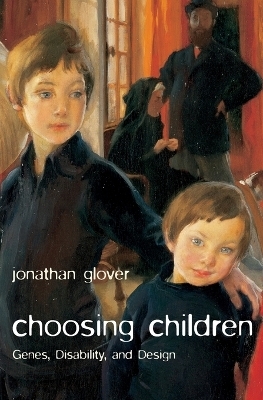
Choosing Children
Oxford University Press (Verlag)
978-0-19-923849-1 (ISBN)
Progress in genetic and reproductive technology now offers us the possibility of choosing what kinds of children we do and don't have. Should we welcome this power, or should we fear its implications? There is no ethical question more urgent than this: we may be at a turning-point in the history of humanity. The renowned moral philosopher and best-selling author Jonathan Glover shows us how we might try to answer this question, and other provoking and disturbing questions to which it leads.
Surely parents owe it to their children to give them the best life they can? Increasingly we are able to reduce the number of babies born with disabilities and disorders. But there is a powerful new challenge to conventional thinking about the desirability of doing so: this comes from the voices of those who have these conditions. They call into question the very definition of disability. How do we justify trying to avoid bringing people like them into being?
In 2002 a deaf couple used sperm donated by a friend with hereditary deafness to have a deaf baby: they took the view that deafness is not a disability, but a difference. Starting with the issues raised by this case, Jonathan Glover examines the emotive idea of 'eugenics', and the ethics of attempting to enhance people, for non-medical reasons, by means of genetic choices. Should parents be free, not only to have children free from disabilities, but to choose, for instance, the colour of their eyes or hair? This is no longer a distant prospect, but an existing power which we cannot wish away. What impact will such interventions have, both on the individuals concerned and on society as a whole?
Should we try to make general improvements to the genetic make-up of human beings? Is there a central core of human nature with which we must not interfere?
This beautifully clear book is written for anyone who cares about the rights and wrongs of parents' choices for their children, anyone who is concerned about our human future. Glover handles these uncomfortable questions in a controversial but always humane and sympathetic manner.
Jonathan Glover is Professor of Ethics at King's College, University of London, and the Director of the Center for Medical Law and Ethics. He is the author of Causing Death and Saving Lives: The Moral Problems of Abortion, Infanticide, Suicide, Euthanasia, Capital Punishment, War, and Other Life-or-Death Choices and Humanity: A Moral History of the Twentieth Century, among other books.
Introduction ; 1. Disability and Genetic Choice ; Disability and Human Flourishing ; Eugenics? ; 2. Parental Choice and What We Owe to Our Children ; The Boundaries of Parental Choice ; Two Dimensions of Ethics ; What do We Owe to Our Children? A Decent Chance of a Good Life ; What do We Owe to Our Children? Respect for Identity and Autonomy ; 3. Human Values and Genetic Design ; The Genetic Supermarket, Inequality, and Entrapment ; Should We Defend a Central Core of Human Nature? ; The Further Future
| Erscheint lt. Verlag | 10.1.2008 |
|---|---|
| Reihe/Serie | Uehiro Series in Practical Ethics |
| Verlagsort | Oxford |
| Sprache | englisch |
| Maße | 135 x 203 mm |
| Gewicht | 158 g |
| Themenwelt | Geisteswissenschaften ► Philosophie ► Ethik |
| Geisteswissenschaften ► Philosophie ► Philosophie der Neuzeit | |
| Medizin / Pharmazie ► Medizinische Fachgebiete ► Medizinethik | |
| Studium ► Querschnittsbereiche ► Geschichte / Ethik der Medizin | |
| Naturwissenschaften ► Biologie | |
| ISBN-10 | 0-19-923849-9 / 0199238499 |
| ISBN-13 | 978-0-19-923849-1 / 9780199238491 |
| Zustand | Neuware |
| Haben Sie eine Frage zum Produkt? |
aus dem Bereich


